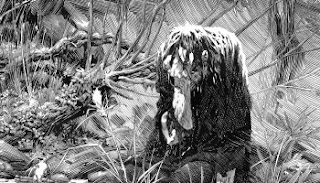Shelley's Frankenstein (or The Modern Prometeus)
A rich woman, mother of one son, reaches a very poor house where another mother is feeding her "babes". She discovers a fair girl among others that are "black-eyed" and "from a different stock". The blonde had been born to a noble family but after her mother died giving birth, this family took her home and treated her the best they could.
It is unknown whether her father was dead or alive or in jail.
"She continued with her foster parents and bloomed in their rude abode, fairer than a garden rose among dark-leaved brambles".
Not only did she manage to keep her "fair" nature, her whiteness and nobility, but also she is given as a present for Dr. Frankenstein from Miss Frankenstein, who really wanted a girl... so let's take her back to the luxurious life she deserves.
No one thought about the "hardly little vagrants" who shared their food with the fairy. They belonged there and it was just natural that they treated her like a princess.
I didn't expect Shelley to be such a racist and sexist....
Ok, keep on reading because maybe she wasn't.
Remember to bear in mind that author and character are not the same individual.
So...
Walton is a man from a wealthy family that is using his money to achieve something great for-according to him-, humanity, no matter how many human lives it costs.
These are Walton's ideas and these are the ideas of the society that rejected The Creature, The Monster. Naif as it may sound nowadays- not in 1830-, the problem of prejudice, of appearance being more important than the inner self, is one of the themes of the books.
Here and there we have man playing God
Literally, Dr. Frankenstein creates something he considers a big step for humanity (F and W have the same aim) just to leave it on its own because it's... ugly, a wretch. He doesn't assume his responsibility for it: he enjoys creating life, but leaves his creature nameless and on its own. He denies it a name, an identity, a father.
However, Shelley, the romantic writer, does not lose her faith in humanism. The Creature manages to learn to read and write, understands family bonds through observation, has access to books and (of course thanks to the literary superpowers of Rationalism) can theorize about his being, his life, humanity and nature, which is where he goes back. He is so adapted to society in spite of not being an active member that he feels remorse for what he has done (he started his vendetta killing F's brother) and is aware of the danger he is for others. Science is not evil, but science should not be a tool of the individual. Science without ethics nor sympathy for the other. Science and progress in the hands of an elite: the vagrants are also illiterate.
The creature wants to atone. And to live. And he asks F for a partner, a woman, an Eve with whom he can go to live to South America (a savage area, supposedly uncivilized). But F wants to wipe him off of the map along with the idea of his offspring sprawling over the world. He is a mistake that has to be put in its place. Erased.
Metaphorically, society creates its outsiders and leaves them no other choice but to live in the margins, on the remains. Society creates injustice and marginality instead of including the different. And then someday the creatures, the freaks, strike back.
'The evil that men do lives after them;The good is oft interred with their bones.' Julius Caesar, one of The Creature's favourite books.




Comentarios
Publicar un comentario